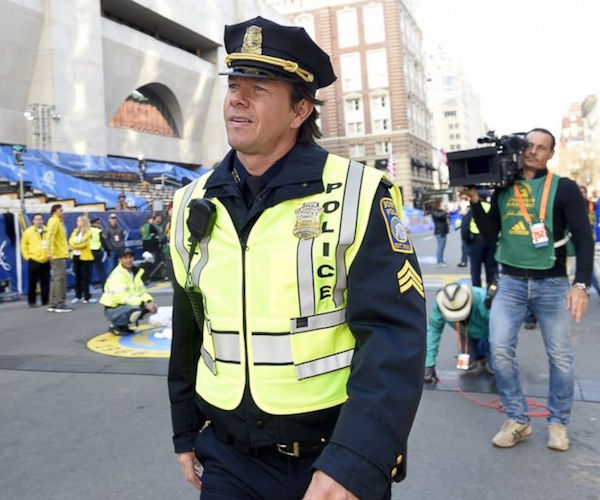Film Review: “Patriots Day” — So Close to Home
Patriots Day provides an intimate view of a heart-stopping week.
Patriots Day, directed by Peter Berg. Screening at cinemas around New England.

Mark Wahlberg in “Patriots Day.”
By Paul Dervis
Hollywood’s effort to make a film about the most traumatic event in Boston’s recent history, a mere three years ago, did not bode well. There was much to fear: deep-seated emotions, heightened by the kind of Tinsel Town rah rah promulgated by twenty years of hokey doc-u-dramas, could easily have resulted in a sappy, pro-American passion play. The courageous heroes are all larger than life; the evil villains all one-dimensional.
Yet that is not what is on offer here.
The Mark Wahlberg vehicle, written and directed by his frequent collaborator Peter Berg, turns out to be a haunting portrayal of seventy-two hours that has left a lasting impression on the local community. And, though American audiences will undoubtedly remember each and every twist and turn of the crime and its aftermath, the narrative comes off as compelling nevertheless, an intimate view of a heart-stopping week.
And the heroes here are not comic book ready; they are simply ordinary folk confronting an extraordinary situation. Even the Tsarnaev brothers, though not fully fleshed out (how could they be?) come across as deeper characters than the normal “bad guys” in most commercial action films.
Wahlberg plays Tommy Saunders (a composite of several policemen), a cop who has a bad leg and is smarting after a bad break on the force. He is required to be a foot soldier doing security for the Marathon. Tommy’s pretty bitter about his lot in life, and nags his superior (John Goodman, who gives one of the weakest performances in the film, terrible Boston accent and all) to be taken off the pedestrian beat.
The film jumps from one household to another. A Watertown Police Sergeant stops by a Dunkin’ Donuts shop on his way to the station. A young couple decides whether to watch the Marathon or take in the Red Sox game. In the Tsarnaev household, Tarerlan’s wife asks him to get milk for the baby, even as his brother is packing the shoulder bags for their fateful trip to Boylston Street. All mundane stuff, but viewers are acutely aware of the significance of what happens during the hours before the race. It masterfully blends the prosaic with heat-thumping anticipation.
Well done, director Berg.
Once the bombs go off, the action and mood of the film turns 180 degrees; the tempo becomes speedy as well as explosive. Chaos ensues (with perhaps too many looks at blood and body parts, particularly for those who are familiar with horror of that day) as the unprepared members of the Boston Police force go into overdrive. There is both conflict and cooperation between the local cops and the FBI, who come in to (apparently) take over. Yet the focus of the investigation, expansive as it is, quickly centers on the brothers and this (as we are well aware) enables the authorities to wrap up the week in the back streets of Watertown in a violent confrontation.
There are no high-fives or smiles in the end.
Wahlberg is a spotty actor (excellent in The Fighter, terrible in Four Brothers). Here he gives his best performance since The Gambler. This is a subtle portrait of a man who is unsure of himself, yet plods on out of temperament; his character’s determination becomes a valuable asset to the investigation.
And J K Simmons, who is dependably solid (who didn’t love him in Juno?), nails the figure of the aging cop stuck in a lackluster, routinized existence. Even Kevin Bacon, who often plays Kevin Bacon, manages to add distinctive power to this film.
Predictably, there has been controversy. Some local talk radio commentators have wondered how much of the film’s profits are going to the victims of the Marathon bombings … and how much is going into Wahlberg’s pockets. It is a fair point. Also, many critics have questioned the timing of the film. Is it not much too soon?
Maybe. But neither of those legitimate issues undercuts the visceral impact of Patriots Day.
Paul Dervis has been teaching drama in Canada at Algonquin College as well as the theatre conservatory Ottawa School of Speech & Drama for the past 15 years. Previously he ran theatre companies in Boston, New York, and Montreal. He has directed over 150 stage productions, receiving two dozen awards for his work. Paul has also directed six films, the most recent being 2011’s The Righteous Tithe
Tagged: Boston Marathon Bombing, Mark Wahlberg, Patriots Day, Paul Dervis

